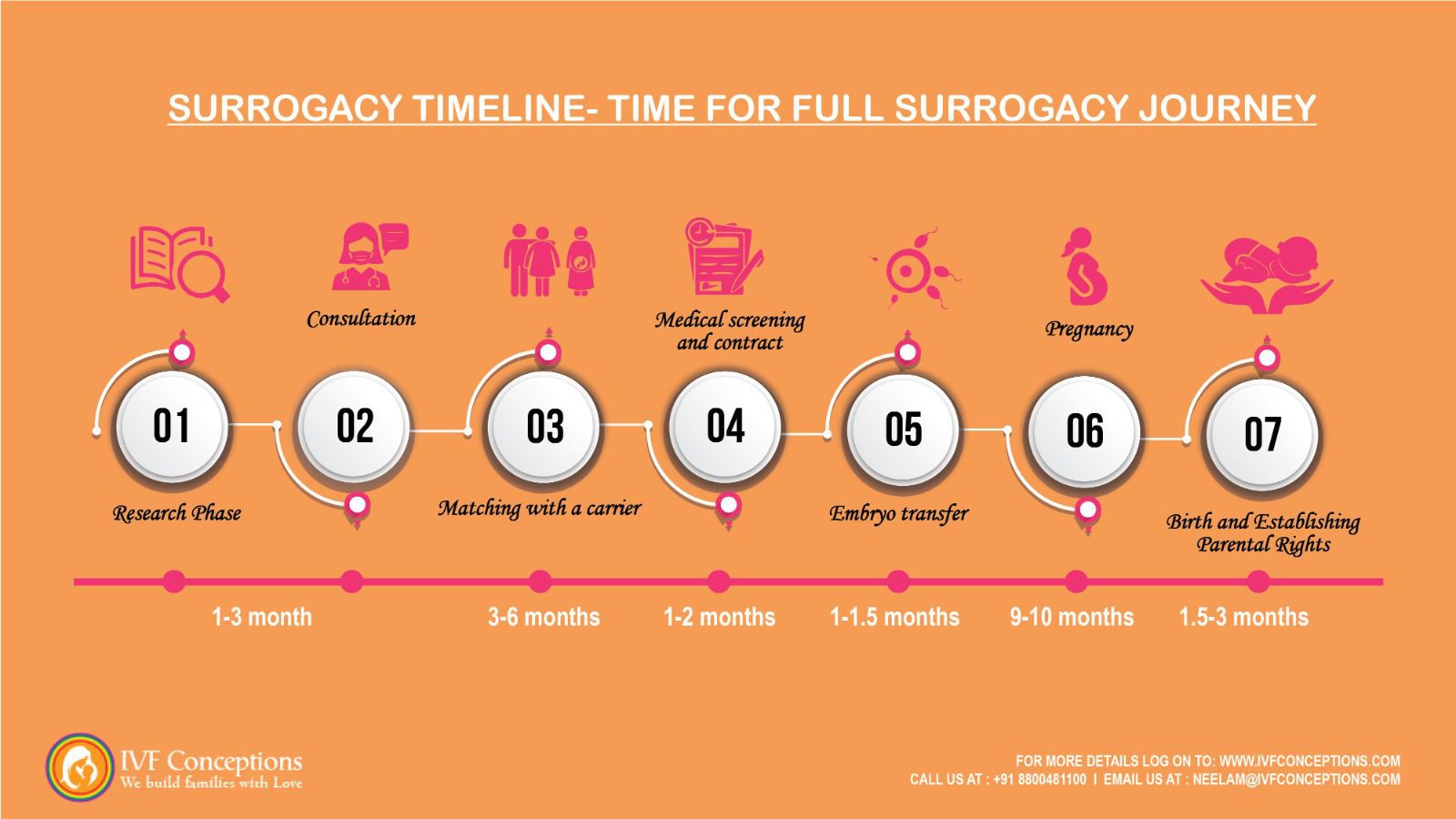Surrogacy for NRI in India- Ethical and Legal Guidelines

Yes, surrogacy for NRI in India is allowed if the couple fulfills the compliance as per the Surrogacy (Regulation) Act, 2021. For Non-Resident Indians (NRIs) and Indian married couples facing the challenge of infertility, surrogacy emerges as a ray of hope, offering the possibility of embracing parenthood.
Non-Resident Indians (NRIs) can pursue altruistic surrogacy in India under strict legal conditions set by the Surrogacy (Regulation) Act, 2021. However, commercial surrogacy remains banned, and only Indian married couples are eligible. This guide explains the legal framework, eligibility criteria, documentation, and alternative options for NRIs considering surrogacy.
Understanding the legal framework surrounding surrogacy in India is paramount. Regulations govern surrogacy arrangements, and it’s essential to be well-informed about the legalities involved to ensure a smooth and legally sound process.
If you’re considering surrogacy as a path to parenthood, understanding the expenses involved is crucial. In this guide, we provide you with detailed insights into the cost of surrogacy in India along with the current legal framework, all in line with the principles of ethics, and legality, ensuring you make an informed decision.
Key Takeaways
✔️ Only NRIs married for at least 2 years can opt for surrogacy in India.
✔️ Commercial surrogacy is banned—only altruistic surrogacy is allowed.
✔️ Egg/sperm donation is restricted; the child must have a genetic link to one parent.
✔️ Legal approvals, including a Medical Board certificate, are mandatory.
✔️ NRIs facing restrictions can explore surrogacy in Georgia, Mexico, or Colombia.
Get in touch for a Free Surrogacy Consultancy:
📲 +91-8800481100 ( WhatsApp, Line, Viber)
Additional guide for surrogacy in India:
Cost of Surrogacy in Mumbai: Affordable Options
Top 5 Best Surrogacy Doctors in Mumbai With High Success Rate (2023)
Best IVF Centers in India – IVF Conceptions
Is Surrogacy in India For Overseas Citizenship of India (OCI) Allowed
Latest Surrogacy Law in India- Surrogacy (Regulation) Act, 2021
How to Find Surrogate Mothers in India
How Much Does Surrogacy Cost In India ( in 2024)?
Legal Issues Related To Surrogacy In India
Surrogacy In India-Everything Parents Need to Know
Top 10 Surrogacy Doctors in India With Affordable Surrogacy Costs

Surrogacy Laws in India
India, known for its cost-effective surrogacy services and a lack of stringent regulations, was once a global hub for commercial surrogacy. However, the absence of clear laws led to unethical practices, exploitation of surrogate mothers, and issues related to the abandonment of children born through surrogacy.
To address these concerns, the Indian government introduced the Assisted Reproductive Techniques (Regulation) Bill in 2014, followed by the Surrogacy (Regulation) Bill in 2016, 2019, and 2020.
The Assisted Reproductive Technology (Regulation) Bill, of 2021, was a significant step in regulating assisted reproductive technology services in India and it outlines the current guidelines for surrogacy in India.
This legislation defines assisted reproductive technology (ART) to encompass various techniques aimed at achieving pregnancy outside the human body, including gamete donation, in-vitro fertilization, and gestational surrogacy. Under this bill, a child born through ART is recognized as the biological child of the commissioning couple, with no parental rights granted to the surrogate mother.
THE SURROGACY (REGULATION) ACT, 2021
- Altruistic Surrogacy only (no direct financial benefit to the surrogate mother)
- Registered Surrogacy Clinic only (ART Registered clinics can perform surrogacy).
- Single woman (divorced or widowed), between the age of 35 to 45 years. A genetic link is a must.
- Married Indian female (25 to 50 years) and male (26 to 55 years).
- Only Indian citizens and OCI are allowed to do surrogacy ( married couples)
- Couple have not had any healthy surviving child biologically or by adoption.
- Have to have Medical indication necessitating gestation surrogacy.
- To obtain a certificate of essentiality from The Appropriate Authority.
- To obtain certificate of medical indication necessitating gestation surrogacy from District Medical Board.
- Parentage Order passed by First class Magistrate.
- Surrogate Mother to obtain eligibility certificate from The Appropriate Authority.
- Surrogacy (Regulation) Amendment Rules, 2024- As of 21st Feb 2024, it is possible to use an egg donor or sperm donor if all other conditions are met.
Additional information for Indian surrogacy guidelines:
Is Surrogacy in India For Overseas Citizenship of India (OCI) Allowed?
Surrogacy In India-Everything Parents Need to Know
Legal Issues Related To Surrogacy In India
Countries Where Surrogacy Is Legal (International Surrogacy 2024)
Becoming a surrogate mother in India

Eligibility for Surrogacy in India
Previously, surrogacy was primarily accessible to infertile NRI and Indian married couples who had struggled with infertility for at least five years within their marriage.
The 2021 amendment brought about changes in surrogacy laws, reducing the waiting period and broadening eligibility criteria for NRI and Indian married couples. However, it is a must to fulfill the conditions/criteria underlined in the regulation bill.
Who is Eligible for Surrogacy in India as an NRI?
| Criteria | Eligibility |
|---|---|
| Marital Status | Only Indian married couples (2+ years of marriage) |
| Age Requirement | Male: 26-55 years, Female: 23-50 years |
| Medical Requirement | Certificate proving infertility is mandatory |
| Surrogacy Type Allowed | Only altruistic (no payment to surrogate) |
| Genetic Link Requirement | Child must have a genetic connection to at least one parent |
| OCI/PIO Card Holders | Subject to additional legal approvals |
| Foreigners & LGBTQ+ Individuals | ❌ Not eligible under Indian law |
🔹 NRIs must complete legal verification before proceeding with surrogacy in India.
Key Provisions of the Surrogacy Bill 2019
- Regulation of Surrogacy
The Surrogacy (Regulation) Bill 2019 categorically prohibits commercial surrogacy but wholeheartedly supports altruistic surrogacy. Altruistic surrogacy allows intending parents to provide compensation to the surrogate mother for medical expenses and insurance coverage during pregnancy.
- Permitted Purposes
Surrogacy is permitted under specific circumstances, including when it is medically established that the couple is infertile and unable to conceive naturally. The couple should not have existed baby. It must also be altruistic and not for commercial gain or exploitation.
- Eligibility Criteria
Intending couples seeking surrogacy must obtain a ‘certificate of essentiality’ and a ‘certificate of eligibility’ issued by the Government of India.
- Protecting the Rights of Surrogate Mothers
In the event that a surrogate or gestational carrier decides not to continue with the pregnancy, the legal framework in India addresses this scenario.
A child born through surrogacy is legally recognized as the child of the intended couple. In cases where abortion is necessary due to medical reasons, surrogacy in India allows the surrogate mother to provide written consent, adhering to the Medical Termination of Pregnancy Act 1971. The surrogate mother can withdraw from the pregnancy before the embryo implantation procedure takes place.
Required Documents for Intending NRI/Indian Parents
NRI surrogacy eligibility:
- To initiate the surrogacy process in India, certain essential documents are required, to ensure a transparent and legal framework:
- A certificate from a district medical board confirming proven infertility.
- Insurance coverage for the surrogate mother for a duration of 36 months.
- An eligibility certificate verifying that the intending parents fall within the age range of 23-50 (for females) and 26-55 (for males). This certificate must be issued by the appropriate authority and is applicable to NRIs, Indian citizens, Overseas Citizens of India ( OCIs), Persons of Indian Origin (PIOs), and foreigners married to Indian citizens.
- The couple must have been married for a minimum of five years and either has no surviving biological or adopted children or have a child with a physical or mental disability. This includes children afflicted by fatal illnesses without a cure.
Legal Documentation Required for NRI Surrogacy
| Document | Purpose |
| Certificate of Essentiality | Confirms infertility & necessity for surrogacy |
| Medical Board Approval | Required from the District Medical Board |
| Surrogacy Agreement | Legally binding contract between intended parents & surrogate |
| Parental Order | Grants legal parental rights to intended parents |
| Visa & Exit Clearance for Baby | Required for returning to the home country |
🔹 NRIs must obtain approvals from the Surrogacy Board before embryo transfer.
Legal Challenges for NRIs Seeking Surrogacy in India
🔴 Delays in securing government approvals – The certification process may take months.
🔴 Restrictions on donor gametes – Only self-eggs and sperm are allowed unless medically justified.
🔴 Parental rights must be legally secured – The parental order is mandatory before exit.
🔴 Citizenship & passport processing delays – NRIs must coordinate with their home country’s embassy.
Alternative Surrogacy Destinations for NRIs
NRIs who do not qualify under India’s surrogacy laws can explore legally secure options abroad.
| Country | Surrogacy Cost (USD) | Legal Status | LGBTQ+ Friendly? |
| USA | $150,000+ | Fully legal (state-dependent) | ✅ Yes |
| Georgia | $50,000 – $75,000 | Legal for married couples | ❌ No |
| Mexico | $60,000 – $80,000 | State-dependent | ✅ Some states |
| Colombia | $60,000 – $80,000 | Fully legal | ✅ Yes |
| Ukraine | $45,000 – $70,000 | Legal for married heterosexual couples | ❌ No |
🔹 Colombia and Mexico provide cost-effective alternatives for NRIs facing Indian legal restrictions.
Surrogacy Cost in India
The cost of surrogacy in India typically ranges from 20 Lacs INR to 35 Lacs INR, which is notably lower than surrogacy costs in many other countries.
The surrogacy cost in India can vary depending upon the medical services, legal services, admin services, and logistic support needed by the intended parents.
As a trusted surrogacy consultant since 2010, we outline the possible and fair surrogacy cost in India for the intended parents. We guide and support our intended parents to fall into the trap of an unethical surrogacy process and give legal options within or outside India.
Total Cost of Surrogacy in India in 2024
|
Surrogacy Package Per IVF Cycle |
Surrogacy Price In India |
What is included |
|
|
Basic Surrogacy Package |
₹9,00,000 |
· Single IVF cycle · Self eggs · Surrogate mother · Medications |
|
|
Advanced Surrogacy Package |
₹10,00,000 |
· IVF cycle · Egg donor · Surrogate mother · Medications |
|
|
Guaranteed Surrogacy Package |
₹18,00,000 |
· Multiple IVF cycles · Self-eggs or egg donor · Surrogate mother · Medications |
|
In summary:
- The basic surrogacy package covers treatment with your own eggs and a single IVF cycle.
- The advanced package subs in an egg donor.
- The guaranteed package includes multiple IVF cycles with a choice of self/donor eggs to increase the chances of success.
Please note these are medical procedure fees along with the medication fees. The cost of legal compliances and legal approval for surrogacy varies from case to case and state to state.
Feel free to get in touch with us to know about your specific surrogacy case and how much the cost of surrogacy in India is for your specific case.
Why Choose Us for Surrogacy in India
- We were in many ways the first Surrogacy provider since 2007.
- We take pride in the fact that we had 100% clearance with our 720+ babies born for international couples.
- Today, the court and lawyer involvement has increased, and so have the clinic’s responsibilities.
- Presently, we believe we are the only clinic in India that is assisting couples at all levels, including Certificate clearances, Legal documentation, and Court orders, unlike other clinics, where they are referring to respective people.
- The costs that have increased are primarily towards the legal and government charges and due to multiple legal compliances and approvals, the overall cost of surrogacy has gone up.
- By keeping all the services under one roof ( legal, medical, admins, evaluations, approvals) we save your time and money and make your surrogacy journey a hassle-free experience. (no need to come in person).
How to Start the NRI Surrogacy Process in India?
✅ Confirm legal eligibility based on marital status, medical need, and genetic link.
✅ Obtain a Certificate of Essentiality & Medical Board clearance.
✅ Sign a legally binding surrogacy agreement through a registered ART clinic.
✅ Secure a court-issued parental order before the baby’s birth.
✅ Complete visa and exit formalities for the newborn.
To confirm all this, can you provide the below details to see if we can assist you with surrogacy in India legally?
- Female Partner Age:
- Male Partners Age:
- Citizenship:
- Marital status:
- Any child?:
- Medical reason for surrogacy:
- Self or donor cycle:
- Present location:
If you will not be eligible for surrogacy in India, we can offer other countries as well. We are happy to set up a consultation call to discuss your options and further assistance, if needed.

Current Surrogacy Process in India
Please read below the basic Surrogacy steps:
#1. Intended Parents eligibility
- Intended parents need to be eligible on multiple levels, legally, medically, nationality, age, etc. You will find the list of criteria mentioned here. Click to learn more.
#2. Surrogacy Legal Documentation
- This is the most important event in the process of surrogacy where the legal team will guide you through the new laws and processes.
- Prepare the affidavits, agreements, and other documents. Will file it to the relevant authorities for approval.
#3. NOC and Court order
- You need an essentiality certificate from the Appropriate authority and the Board. Post which the Court needs to provide the Court order.
#4. Surrogate Verification
- Surrogate post verification from the Appropriate Authority, will undergo endometrial preparation and get ready for transfer.
#5. IVF Process
- Once we have all the documents in place we can start the IVF process, surrogate preparation, and plan for a transfer date.
#6. Ante-natal Care (Pregnancy)
- We regularly communicate with you in regards to the progress of the pregnancy and surrogate care throughout the 9 months.
#7. Coordinating Delivery
- Close to the delivery date, we help plan the delivery and the requirements.
- At birth, the baby will be handed over to you and you need to stay in the hospital for 2-3 days to ensure everything is good for the baby.
#8. Closure of Surrogacy
- Post one or two months of delivery, once the surrogate is healthy, she signs off an NOC, which gives a closure for the program.

Final Thoughts: Is Surrogacy in India a Good Option for NRIs?
Surrogacy in India is highly regulated, and only a limited group of NRIs qualify. Those who do not meet the eligibility criteria should consider international surrogacy in Georgia, Mexico, or Colombia, where regulations are more accommodating.
If you will not be eligible for surrogacy in India, we can offer other international surrogacy countries as well. We are happy to set up a consultation call to discuss your options and further assistance if needed.
📌 Need Expert Guidance on NRI Surrogacy? 📩 Get a free consultation with a surrogacy expert today!
🌍 Website: www.ivfconceptions.com
📧 Email: neelam@ivfconceptions.com
📲 WhatsApp/Viber/Line: +91-8800481100
It is possible to do surrogacy for NRIs in India if they fulfill the eligibility criteria set by the latest surrogacy laws. As a leading surrogacy consulting service in India and abroad, we help intended parents find the best surrogacy services globally.

FAQs for Surrogacy for NRI in India
Can Non-Resident Indians (NRIs) opt for surrogacy in India?
Yes, NRIs can opt for surrogacy in India. However, there are legal and regulatory guidelines that must be followed as per the Surrogacy (Regulation) Act, 2021.
What are the legal regulations for surrogacy in India for NRIs?
The legal regulations for surrogacy in India for NRIs involve compliance with the Surrogacy (Regulation) Act, 2021, which sets strict guidelines for surrogacy arrangements, including eligibility criteria and legal procedures.
Are there any restrictions on the nationality of intended parents for surrogacy in India?
The Surrogacy (Regulation) Act, 2021, allows only Indian citizens and NRIs to opt for surrogacy in India. Foreign nationals, except NRIs and OCIs, are not permitted to engage in surrogacy arrangements in India.
How can NRIs navigate the visa requirements for surrogate-born children?
NRIs who opt for surrogacy in India need to apply for an appropriate visa for their surrogate-born child to travel to their home country. They should consult with the relevant authorities and follow the visa application process.
Are there any specific eligibility criteria for NRIs seeking surrogacy in India?
Yes, there are specific eligibility criteria for NRIs seeking surrogacy in India. These criteria typically include age restrictions, marital status, the ability to prove infertility, non-usage of the egg donor, and only involvement in altruistic surrogacy.
What are the ethical considerations for surrogacy involving NRIs in India?
Ethical considerations in surrogacy involving NRIs in India include informed consent of all parties involved, fair compensation for the surrogate, and ensuring the well-being of the surrogate and the child throughout the process.
How does the surrogacy process work for NRIs in India? The surrogacy process for NRIs in India typically involves finding a suitable surrogate, legal agreements, medical procedures, and ensuring compliance with the Surrogacy (Regulation) Act, 2021. The process can vary depending on the fertility clinic and legal requirements.
Are there any potential legal issues NRIs should be aware of in surrogacy arrangements in India? NRIs should be aware of potential legal issues related to surrogacy, such as the need to adhere to the Surrogacy (Regulation) Act, 2021, and ensure all legal documentation is in order. Additionally, they should seek legal counsel to navigate any legal complexities that may arise during the process.
More Resources:
- American Society for Reproductive Medicine (ASRM): https://www.asrm.org/
- The American Infertility Association (AIA): https://resolve.org/
- Family Equality Council: https://www.familyequality.org/
- National Center for Lesbian Rights (NCLR): https://www.nclrights.org/

